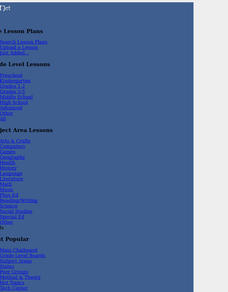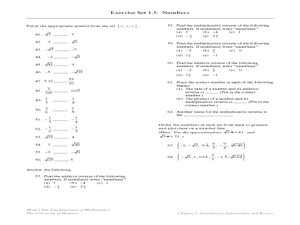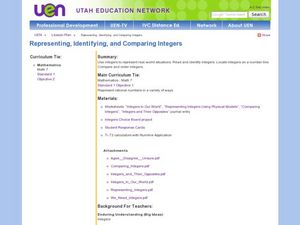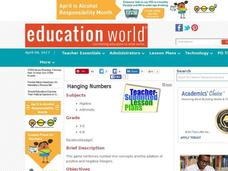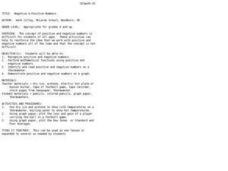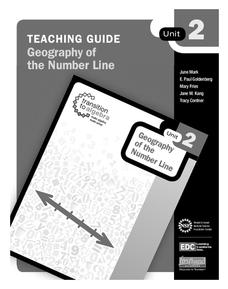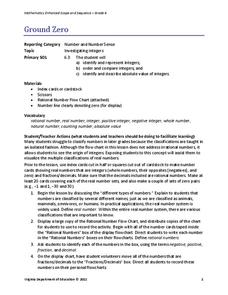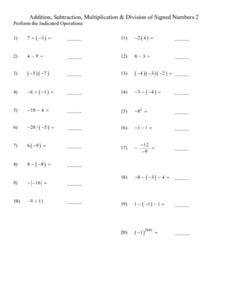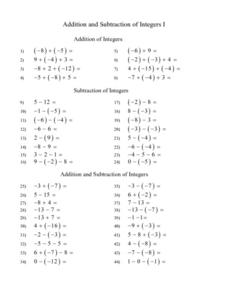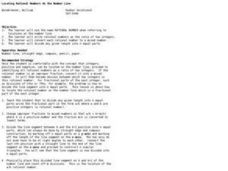Curated OER
Subtracting Integers: Math, Physical Education, Dancing, Negative Numbers
Students demonstrate their understanding of positive and negative integers by adding and subtracting. More importantly, students explain why a negative number, subtracted from a negative number, changes the operation.
Curated OER
Numbers 1.1
In this numbers 1.1 worksheet, pupils solve 64 problems about all kinds of numbers: rational, irrational, prime, composite, square roots, fractions, decimals.
Curated OER
Integer War
Sometimes all it takes for a good review is a game of cards. Review the processes needed to add, subtract, divide, and multiply integers. In groups, learners play the card game war with a twist. They can use the numbers as either...
Utah Education Network (UEN)
Representing, Identifying, and Comparing Integers
This resource will knock your "sox" off! It comes with so many worksheets, projects, and other attachments that help you prepare your mathematicians to see positive and negative integers in the real world, including the White Sox stadium...
Curated OER
Number Line Game
Students understand number line concepts and the addition of positive and negative integers. In this number line lesson, students create and use a number line to play a game. Students will use different colored dice to represent positive...
Curated OER
Hand Washing: I can handle it!
Sixth graders examine microorganisms. In this germs lesson, 6th graders observe and record data on the positive and negative aspects of microorganisms. Students complete activities, view a film, and explore websites.
Curated OER
Negative & Positive Numbers
Pupils recognize positive and negative numbers and perform mathematical functions.
Education Development Center
Geography of the Number Line
It's more than just numbers on a line, its an organizational, mental math machine to help learners understand the value of numbers. The tool is handy when introducing positive and negative integers to see their values and...
EngageNY
Extending the Domain of Sine and Cosine to All Real Numbers
Round and round we go! Pupils use reference angles to evaluate common sine and cosine values of angles greater than 360 degrees. Once they have mastered the reference angle, learners repeat the process with negative angles.
Curated OER
Integers
Students multiply integers. In this multiplying integers lesson, students multiply positive and negative integers. Students discuss that a positives times positives, positives times negatives, and negatives times...
Curated OER
Research Lesson
Once you have introduced the concept of comparing positive fractions, use this plan to further understanding. Pupils will start mixing positive and negative fractions through various learning activities. Note: Adapt this lesson plan to...
Curated OER
Use Models to Compare and Order Integers
Students investigate the concept of integers and how they should occur in the realm of irrational numbers. The lesson includes the use of positive and negative integers. The lesson is a good foundation in order to move into calculating...
Curated OER
Understanding Oxidation Numbers
Students review atomic numbers, positive and negative charges, and the periodic table. They examine the relationships among protons and electrons, location of various elements, electron energy levels, and oxidation numbers.
Curated OER
Addition and Subtraction of Real Numbers
In this math worksheet, young scholars solve the problem using the operations of addition and subtraction. The answers are expressed as positive or negative numbers.
Pennsylvania Department of Education
Fractional Parts Using an Area Model
Learners explore multiplying fractions and their relationship to parts of a whole. They draw and shade fractional parts to show parts of a whole and fractional parts of a fraction. Pupils also use an Internet site for interactive...
Virginia Department of Education
Ground Zero
Don't harbor any negative feelings toward negative numbers. Scholars learn about different classifications of rational numbers, including negative integers. They also develop definitions of the opposite and the absolute value of a...
Curated OER
Cherries Still Positive, Lemons Still Negative
Third graders explore positive and negative integers. This follows a lesson entitled, Cherries Are Positive, Lemons Are Negative and uses Cherry heads and Lemon heads.
Curated OER
Addition, Subtraction, Multiplication and Division of Signed Numbers 2
In this operation worksheet, learners solve integer equations using one operation. The equations require students to add, subtract, multiply or divide positive and negative numbers. Most equations contain only two integers, but a few...
Curated OER
Addition and Subtraction of Integers 1.1
In this integer worksheet, young scholars add and subtract positive and negative numbers. Equations contain two to three terms with a mixture of finding the sum and difference of terms. This worksheet contains 44 equations.
Curated OER
Addition and Subtraction of Signed Numbers
Young scholars explore the concept of adding and subtracting using positive and negative numbers. For this addition and subtraction of signed numbers lesson, students use pennies to represent positive and negative numbers. Young scholars...
Curated OER
Modular Mathematics
Learners are introduced to modular mathematics. They start by making clocks for different bases. They use their clocks to count, using the base, and then finding the mod or remainder. They explore both positive and negative numbers with...
Curated OER
Locating Rational Numbers on the Number Line
Young scholars explore the concept of locating rational numbers on a number line. In this rational numbers lesson, students change improper fractions to mixed numbers to determine where on a number line the rational number belongs. Young...
University of the Desert
Why Is Cultural Diversity a Positive Thing?
From more empathetic individuals to greater tolerance in government, learners explore the benefits of a culturally diverse world through a series of collaborative, discussion-based activities.
Curated OER
A Human Number Line
Sixth graders create a human number line through use of symbols, equality, inequality, addition, subtraction, solving equations and inequalities
